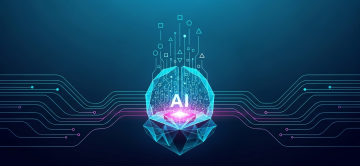Hierarchical AI Agents: A Guide to CrewAI Delegation

The Hierarchical Agent Team: A Practical Guide to Orchestrating Specialist Agents with CrewAI
This is where CrewAI's delegation capability becomes a cornerstone of advanced agent architecture. At ActiveWizards, we architect hierarchical teams where a "manager" agent decomposes a complex goal and delegates sub-tasks to a crew of "specialist" agents. This guide provides a practical blueprint for this powerful pattern, showing you how to orchestrate a manager-worker dynamic to build more capable and robust autonomous systems.
The "Why": Limits of Flat Structures & The Need for Delegation
A flat (sequential or parallel) crew fails when a task is too big for any single agent. This leads to two primary problems:
- Task Overload: An agent given a massive, vague goal will struggle to perform all necessary steps. Its reasoning process becomes muddled, and the quality of its output degrades significantly.
- Lack of Modularity: The workflow is brittle. If one part of a large, monolithic task fails, the entire process must be restarted. There is no separation of concerns.
The solution is delegation. A manager agent acts as an orchestrator, breaking the main problem into smaller, focused sub-tasks and assigning them to specialist agents who are experts at executing exactly one thing. This mimics a real-world, high-performing project team.
Diagram 1: The hierarchical structure with a Manager agent delegating to Specialists.
Practical Implementation: The Market Analysis Crew
Let's build a hierarchical team to produce a market analysis report for a new product. We'll need two specialists—one to analyze product features and another to research market trends—and a manager to oversee the process and synthesize their findings.
Step 1: Define the Specialist "Worker" Agents
These are our hands-on experts. They have narrow roles and are not expected to delegate. Note that `allow_delegation` is explicitly `False`.
from crewai import Agent, Task, Crew
from langchain_community.tools import DuckDuckGoSearchRun
search_tool = DuckDuckGoSearchRun()
# Specialist Agent 1: Product Analyst
product_analyst_agent = Agent(
role="Lead Product Analyst",
goal="Perform a detailed analysis of a given product's website to identify its key features, benefits, and target audience.",
backstory="You are an expert at dissecting product websites and extracting the core value propositions.",
tools=[search_tool], # Could also have a website scraping tool
allow_delegation=False,
verbose=True
)
# Specialist Agent 2: Market Analyst
market_analyst_agent = Agent(
role="Senior Market Research Analyst",
goal="Analyze the current market landscape for a given product, identifying key trends and top competitors.",
backstory="You are a master of market dynamics and competitive intelligence, skilled at using search tools to uncover strategic insights.",
tools=[search_tool],
allow_delegation=False,
verbose=True
)
Step 2: Define the "Manager" Agent
This is the orchestrator. Its purpose is to manage the specialists. The critical parameter here is `allow_delegation=True`, which empowers it to assign tasks to other agents in the crew.
# Manager Agent: Strategy Manager
strategy_manager_agent = Agent(
role="Chief Strategy Officer",
goal="Orchestrate a team of analysts to produce a comprehensive market analysis report for a new product.",
backstory=(
"You are a strategic mastermind, skilled at breaking down complex business questions "
"and delegating work to the right specialists to get a complete picture."
),
allow_delegation=True, # This is key!
verbose=True
)
Step 3: Define the High-Level Task and Assemble the Crew
This is the most important part of the setup. We only define *one* high-level task and assign it to our manager agent. The manager will then dynamically create and delegate the sub-tasks to the specialists. The `agents` list must include all agents so the manager knows who is on its team.
Expert Insight: The Magic of Implicit Delegation
Notice we do not define tasks for the specialist agents. The Manager Agent, powered by its LLM, infers the necessary sub-tasks from the main goal and the available agents' roles. This makes the system incredibly dynamic and powerful.
# Define the one, high-level task for the manager
manager_task = Task(
description=(
"Conduct a comprehensive market analysis for the new 'AI-powered Personal CRM' product. "
"First, analyze its features from its website (assume a hypothetical website exists). "
"Second, research the current market trends for personal CRMs. "
"Finally, compile these findings into a single, cohesive report."
),
expected_output=(
"A full market analysis report in Markdown format, including a "
"Product Features section and a Market Trends section."
),
agent=strategy_manager_agent,
)
# Assemble the hierarchical crew
hierarchical_crew = Crew(
agents=[strategy_manager_agent, product_analyst_agent, market_analyst_agent],
tasks=[manager_task],
verbose=2
)
# Kick off the hierarchical workflow
# result = hierarchical_crew.kickoff()
# print(result)
Architectural Checklist for Hierarchical Teams
Deploying hierarchical crews requires careful architectural consideration to ensure they are efficient and reliable.
- Manage Cost and Complexity: Delegation creates more LLM calls. A manager asking a question, a specialist answering, and the manager processing the answer is at least three calls. This can escalate quickly. Monitor token usage closely.
- Prevent Delegation Loops: Poorly defined roles can lead to agents delegating tasks back and forth in an infinite loop. Ensure specialist agents have `allow_delegation=False` and that the manager's prompt clearly guides who to delegate to for specific sub-tasks.
- Tool Allocation: Decide strategically which agents need tools. It's often best for only specialist "worker" agents to have tools (like web search or database access), keeping the manager focused purely on orchestration and synthesis.
- Error Handling and Retry Logic: What if a specialist fails its delegated task? A production-grade manager should be prompted to handle such failures, either by retrying the task, delegating to a different agent, or flagging the failure in its final report.
Conclusion: The Future of AI Work is Orchestration
Hierarchical agent teams represent a significant leap in the capability of autonomous systems. By moving from a flat structure to a managed, delegated workflow, we can solve problems of far greater complexity and nuance. This pattern is less about prompt engineering and more about organizational design for AI.
Architecting these sophisticated crews is a core competency at ActiveWizards. We combine deep knowledge of frameworks like CrewAI with rigorous systems engineering to build intelligent, hierarchical systems that can reason, delegate, and deliver powerful results for the enterprise.
Build Your Advanced Agent-Based System
Ready to tackle complex business problems with a team of orchestrated AI agents? Our experts specialize in designing and deploying hierarchical agentic systems that are robust, efficient, and tailored to your operational needs.



Comments (0)
Add a new comment: